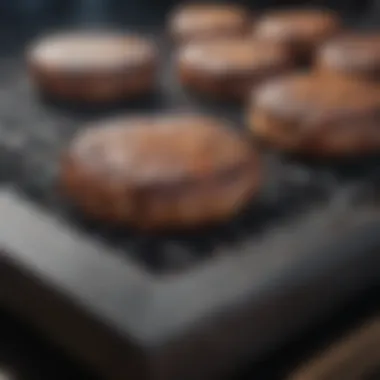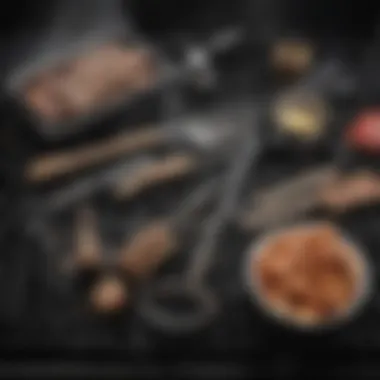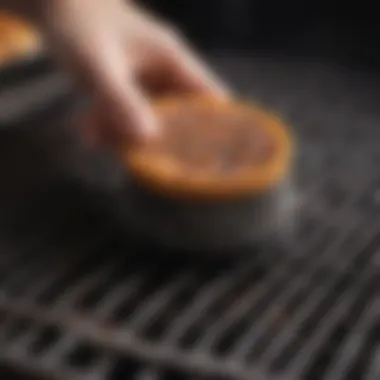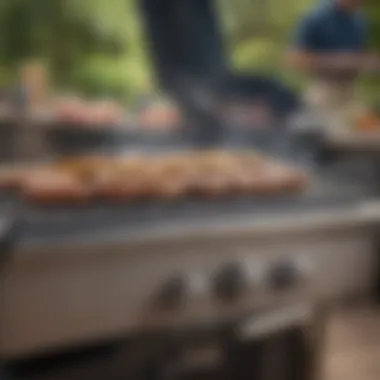Comprehensive Guide to Cleaning Your Grill Effectively


Intro
Maintaining a grill is crucial for optimal cooking performance and longevity. A dirty grill can lead to uneven cooking and unhealthy food. This article tackles the techniques and tools necessary for effective grill cleaning. It will also discuss the importance of routine maintenance and the distinct approaches for gas and charcoal grills. Understanding these elements ensures a safe and hygienic cooking environment, which is essential for any grill enthusiast.
Cleaning a grill go beyond mere aesthetics. A clean grill prevents the buildup of grease and food residue that can harbor bacteria and affect flavor. Regular care not only enhances the taste of your food but also prolongs the life of your grill. Therefore, whether you are a novice or a seasoned griller, grasping the fundamentals of grill cleaning is essential.
In the following sections, we will explore various cleaning methods, safety precautions, and eco-friendly practices. Emphasis will be placed on ensuring an effective cleaning regimen tailored to both gas and charcoal grills. Here we begin with a comprehensive overview of what cleaning a grill involves.
Foreword to Grill Cleaning
Cleaning a grill is more than a routine chore; it is a vital practice that ensures longevity and optimal cooking results. A clean grill not only enhances the taste of grilled foods but also preserves the equipment’s functionality. Residues from previous cooking sessions can cause unpleasant flavors, affect heat distribution, and even pose health risks to those who consume food cooked on a dirty surface.
When maintaining a grill, the method used for cleaning can vary depending on the type of grill in question. Each grill type has its own specific needs that, if neglected, can lead to more significant problems down the line. Understanding the importance of regular cleaning and proper techniques can greatly improve the grilling experience.
Moreover, this guide aims to outline the various approaches to grill cleaning based on equipment type and condition. By emphasizing best practices and necessary precautions, individuals can promote both safe cooking environments and enjoyable barbeque experiences.
Importance of Cleaning a Grill
Grill cleaning serves several important purposes. Primarily, it minimizes the buildup of grease and food particles that can ignite during cooking, potentially leading to flare-ups and unsafe cooking conditions. Furthermore, food residue can harbor bacteria, which can contaminate meals prepared on the grill.
Maintaining a clean grill also enhances performance. Clogged burners or barbecue grates restrict airflow and heat, leading to uneven cooking. For gas grills, this can damage the burners and, ultimately, affect their efficiency. Charcoal grills, on the other hand, can face air flow issues which might hinder charcoal combustion if not properly cleaned.
Regular cleaning should be viewed as preventative maintenance. This helps avoid costly repairs and replacement of grill parts. Moreover, equipment that is well-maintained retains its resale value, should the owner decide to upgrade later. In summary, a clean grill promotes safety, improves the quality of cooked food, and extends the lifespan of the grill itself.
Overview of Different Grill Types
Grills are generally categorized into three main types: gas, charcoal, and electric. Understanding the differences among these types is crucial for effective cleaning practices.
- Gas Grills boast a quick setup and precise temperature control. However, they require regular cleaning of burners and grates to prevent residue buildup that can impede function.
- Charcoal Grills offer a unique smoky flavor but involve ashes and debris that must be regularly removed for safety and performance.
- Electric Grills are less common but convenient for indoor use. Although they may seem easier to clean due to reduced soot and ash, they still need attention to heating elements and grease trays.
In this guide, we will examine tailored cleaning methods for each type of grill to ensure that owners can choose the best approach according to their specific device.
Preparation Steps Before Cleaning
Preparing for grill cleaning is a critical step that lays the foundation for a successful and efficient process. Proper preparation not only enhances the effectiveness of your cleaning but also ensures safety and convenience. This phase involves gathering tools, selecting the right timing, and creating a plan that respects the nuances of both gas and charcoal grills.
Gathering Necessary Tools
Before undertaking the cleaning process, you must gather the right tools. Having the appropriate instruments can greatly impact the results you achieve. Here are the essential tools:
Grill Brush
The grill brush is an indispensable tool for cleaning. It is specifically designed to remove stubborn food particles and grease that cling to the grates. A good-quality grill brush typically features metal bristles that effectively scrub away debris without damaging the grill surface. It is a popular choice due to its efficiency, especially when used on heated grates. The key characteristic of a grill brush is its bristle strength, which allows it to tackle tough, burnt-on food. However, one must replace them periodically to ensure safe usage, as worn brushes can leave behind fibers that may mix with food.
Scrapers


Scrapers are another essential tool. They ensure a thorough clean by addressing remnants that brushes cannot effectively remove. Typically made from metal or plastic, scrapers can fit into narrow spaces and corners of the grill. They are beneficial for their capability to lift stuck-on residue while preventing scratches. A unique feature of some scrapers is a beveled edge, which adds precision when scraping off stubborn bits. However, they may not be suitable for all grill types, so caution is advised.
Cleaning Solutions
The effectiveness of your cleaning often hinges on the solutions you use. Cleaning solutions specifically made for grills help break down grease and grime better than plain water or soap. Many options are available, such as those with natural ingredients that are eco-friendly but tough on dirt. The key feature of these solutions is their ability to penetrate and dissolve dirt, making the scrubbing process faster. Nevertheless, it is crucial to choose solutions that are safe for your grill's material.
Protective Gear
Protective gear is critical during the cleaning process. Using gloves and safety goggles can prevent injuries and irritation from harsh chemicals and rising debris. Gloves will keep hands safe, while goggles protect the eyes from splashes. The key characteristic of protective gear is its ability to provide a barrier against possible hazards, making it a necessary choice when engaging in thorough cleaning tasks. While this may seem like a simple element, it significantly increases safety and comfort during the cleaning routine.
Choosing the Right Cleaning Time
Selecting an appropriate time for cleaning is often overlooked, yet it holds significant importance. Timing can influence the ease of cleaning as well as the grill’s readiness for use afterward. Ideal moments include after a cooking session when the grill is still warm, enabling grease and debris to be more easily removed. Conversely, cleaning right after cooking may not be suitable if you plan to use it again shortly. In summary, aligning your cleaning time with your cooking schedule can streamline the maintenance process, ensuring that your grill is always ready for your next culinary adventure.
Cleaning a Gas Grill
Cleaning a gas grill is vital for multiple reasons. Firstly, it maintains the efficiency of the grill. Food buildup and grease can hamper its performance, affect heat distribution, and create uneven cooking. Secondly, regular cleaning prevents flare-ups and promotes safer cooking. A thorough cleaning also helps in preserving the grill’s life span, allowing for long-term enjoyment. Therefore, maintaining a clean gas grill is not merely a cleanliness issue; it is a crucial part of being a responsible grill owner.
Turning Off the Gas Supply
Before starting any cleaning process, the first step is to ensure that the gas supply is completely shut off. This is not just a recommendation but an absolute necessity. Utility safety dictates this practice. By turning off the gas, you eliminate the risk of accidental ignition during cleaning. It is crucial that owners double-check and confirm the shut-off position, ideally using the control knobs on the grill itself. Some models may have additional valves or connections that also need to be closed.
Removing and Soaking Grates
Grill grates endure heavy use and often become the most soiled part of the grill. Removing them for soaking is essential for effective cleaning.
Preparation of Soaking Solution
For optimal results, a soaking solution should combine hot water and a suitable cleaning agent, such as dish soap or a specialized grill cleaner. This solution works effectively to loosen food particles. The key characteristic of this preparation lies in the heat; hot water enhances the ability of the cleaning agent to break down ingrained grease. This makes it a beneficial choice for tackling tough residues found on grates. The unique feature of this solution is its versatility, allowing users to adjust proportions based on the grime level. An advantage is that it minimizes scrubbing later, saving time and effort.
Duration for Soaking
Duration for soaking the grates can significantly impact cleaning effectiveness. It is recommended to let the grates soak for at least 15 to 30 minutes. This time allows enough exposure to the cleaning solution, ensuring that stubborn grime can be lifted easily. The key characteristic of this duration is that it optimally balances soaking time with practicality. This choice is popular among grill enthusiasts who want to maximize cleaning efficiency without wasting time. However, over-soaking can sometimes lead to rust or corrosion in metal grates, so careful monitoring is essential.
Scrubbing the Grill Interior
After soaking, scrubbing the grill’s interior is crucial. This step removes leftover debris and grease that accumulation during cooking.
Using the Grill Brush
Using a brush specifically designed for grills is effective for removing residual food particles and grease. A quality grill brush has stiff bristles that can penetrate the build-up, ensuring a thorough clean. This tool’s key characteristic is its ability to reach into the crevices where grime often hides. This makes it a crucial choice in any cleaning routine. A unique feature is the option between stainless steel or nylon bristles, with each having its advantages. Stainless steel offers durability, while nylon is safer for porcelain-coated grates, preventing scratching.
Addressing Stubborn Residue
Some residues simply do not lift away easily. In those cases, targeted scraping techniques can be necessary. Addressing stubborn residue involves using a scraper alongside a grill brush to physically detach remaining particles. The key characteristic of this technique lies in its focused approach; it ensures every part of the grill gets attention. This method is a beneficial addition to comprehensive cleaning, particularly after hard grilling sessions. The unique requirement here is to ensure not to gouge the grill surfaces, which can lead to wear and tear.
Cleaning the Burner Tubes


Another important aspect of cleaning gas grills is ensuring that the burner tubes are free from clogs. A clean burner allows for even heating and reduces the chance of flare-ups. Clogs can create dangerous situations, making this part of the grill cleaning process essential for safety. Inspect the tubes closely for accumulated grease and food debris, using a small brush or a pipe cleaner for thorough cleaning.
Final Rinsing and Drying
After the thorough cleaning, ensuring that everything is rinsed and dried properly is important. A final rinse with water removes any residual cleaning agent left on surfaces. Following this, drying the components with a clean towel or letting them air dry is necessary to prevent rust and corrosion. This last step reinforces the effort taken thus far and ensures optimal performance the next time the grill is used.
Cleaning a Charcoal Grill
Cleaning a charcoal grill is a crucial component of maintaining its efficiency and lifspan. Unlike gas grills, charcoal grills require specific attention due to the ash and debris that accumulates during use. Regular cleaning ensures that the grill heats evenly, which in turn enhances the quality of cooking. When ash builds up, it can obstruct airflow, making it difficult to control temperature. Moreover, cleaning a charcoal grill helps prevent unwanted flavors from transferring to food. This section offers comprehensive steps to properly maintain your charcoal grill.
Removing Ashes and Debris
The first step in cleaning a charcoal grill is removing ashes and debris. After cooking, once the grill has cooled down, it is vital to dispose of the ash from the bottom. Not only does it create a clean space for your next grilling session, but it also prevents the build-up of unwanted smells and potential fire hazards. To effectively remove the ashes, scoop them out using a small shovel or dust pan. You can also use a vacuum preferably designed for ash collection. It is important to ensure that the grill is completely cool before this process to avoid any burns.
Cleaning the Grill Grates
Once the ash is out, the next focus should be on the grill grates. A clean grate ensures that food doesn't stick and remains uncontaminated from remnants of past meals.
Use of Specialized Brushes
The use of specialized brushes is essential for maintaining the grill grates. These brushes are designed specifically to help remove stubborn residue and grease effectively. A critical characteristic of these brushes is their bristle composition, often made from stainless steel or brass, which provides durability. Choosing a brush with a comfortable handle can also aid in providing better control during cleaning. However, care should be taken to select brushes that do not shed bristles, as these fibers can end up in food.
Applying Cleaning Solutions
In addition to utilizing brushes, applying cleaning solutions enhances the cleaning process. Solutions that are eco-friendly and specifically formulated for grill maintenance are a popular choice. These solutions often contain enzymes that break down grease and grime, making it easier to scrub away tough stains. One unique feature of such cleaners is their ability to act quickly, allowing you to clean more efficiently. However, always ensure that the solution is safe for your specific grill type to avoid any damaging reactions.
Inspecting and Maintaining Vents
An often overlooked aspect of charcoal grill cleaning is inspecting and maintaining the vents. Proper airflow is fundamental for heat retention and ignition efficiency. Regular checks for built-up grease or ash in the vents can significantly improve the overall performance. Cleaning these areas using a damp cloth or brush can help maintain free airflow and ensure that grilling is both efficient and effective.
Ensuring Charcoal Compartment is Clear
Lastly, ensuring the charcoal compartment is clear is crucial. This area not only holds the coal but also affects air circulation within the grill. Any blockage here can lead to poor combustion. After removing ashes, it is wise to confirm that the compartment is clean. Using a brush can be beneficial for scraping any leftover particles. Keeping this compartment clean enhances the grill's ability to reach high temperatures and contributes to a more enjoyable barbecuing experience.
Post-Cleaning Procedures
Post-cleaning procedures are crucial in maintaining the longevity and efficiency of your grill. Cleaning may have removed the dirt and grime, but what comes next is just as important. Proper post-cleaning ensures that your grill remains in optimal condition for future cooking sessions. Reassembling, seasoning, and safe storage are all part of these procedures. Neglecting any of these aspects can lead to performance issues or even damage in the long run.
Reassembling the Grill
After cleaning, reassembling the grill is not only a necessary step but also an opportunity to ensure everything is in its right place. Make sure to put back all components, such as grates and burners, securely. Often, it's easy to miss a small piece or not secure a grate tightly enough, which could lead to uneven cooking or safety hazards during grilling. Check for any leftover cleaning solutions that could harm the food or grill performance.
Seasoning the Grill
Seasoning the grill serves a dual purpose: it enhances the flavor of your food and protects the grill from rust. This step involves applying a light coat of oil to the grates after they have been reassembled. Choose an oil with a high smoke point, such as canola or grapeseed oil. Heat the grill for a few minutes to allow the oil to bond with the metal, creating a protective layer. This is essential to avoid food sticking to the grates and will also contribute to a better grilling experience.


Storing the Grill Properly
Storing your grill properly helps to prolong its lifespan and ensures it's ready for your next cooking adventure.
Cover Use
Using a cover for your grill is a simple yet effective way to protect it from the elements. A good cover should be durable and weather-resistant. Covers prevent dirt, debris, and moisture from accumulating, which could lead to rust or corrosion. In addition, a cover keeps pests away, providing another layer of protection. A key feature of covers is their availability in various sizes, allowing you to find one that fits your grill perfectly. While covers are beneficial, ensure that they fit well to allow adequate airflow; otherwise, they could trap moisture underneath.
Indoor vs. Outdoor Storage
Where you choose to store your grill can impact its durability. Indoor storage is generally considered safer from the elements, as it can help prevent rust and fading from sunlight. However, it may require some effort to move the grill inside each time you finish grilling. On the other hand, outdoor storage is convenient for regular grilling but may subject your grill to rain, snow, or harsh sunlight. The key characteristic here is exposure to the environment and how that affects the various materials of your grill. Assess your local weather conditions and choose the most suitable option for your situation.
Safety and Environmental Considerations
Ensuring safety and being environmentally conscious are crucial when cleaning a grill. This is not just about maintaining your grill's functionality but also about safeguarding your health and the environment around you. Proper cleaning practices minimize hazards and prevent the use of potentially harmful chemicals, thus promoting a healthier grilling experience.
Workplace Safety Tips
When embarking on the cleaning journey, it is imperative to consider your safety first. Here are some essential tips to keep in mind:
- Wear protective gear: Always put on gloves to shield your hands from cleaning solutions and potential sharp edges on the grill. Safety goggles can protect your eyes from debris that may dislodge during cleaning.
- Ensure adequate ventilation: If you are cleaning indoors, open windows and doors. Good airflow reduces the buildup of fumes from cleaning agents.
- Use tools correctly: Familiarize yourself with your cleaning tools. For example, a grill brush should be used gently to avoid damaging the grill surface while effectively removing residue.
- Check gas supply: For gas grills, ensure that the gas supply is shut off during cleaning to prevent any fire hazards.
- Keep your workspace clear: A clutter-free area diminishes the risk of accidents. Ensure all tools and cleaning supplies are organized and within reach, but not crowding your workspace.
By adhering to these tips, you create a safer environment for yourself and those around you.
Eco-Friendly Cleaning Solutions
Using eco-friendly cleaning solutions is vital for both health and sustainability. Traditional cleaning agents can be harmful to the environment. They often contain harsh chemicals that may lead to water contamination or harm local wildlife. Instead, consider the following alternatives that are effective yet gentle on the planet:
- Vinegar and water: This combination is excellent for breaking down grease. Mix equal parts of vinegar and water in a spray bottle. Apply it to the grill and wipe clean.
- Baking soda paste: Baking soda mixed with a small amount of water forms a paste that serves as a gentle abrasive. Apply to stubborn spots and scrub gently.
- Lemon juice: The natural acidity of lemon juice cuts through grease while leaving a fresh scent. You can combine lemon juice with baking soda for added cleaning power.
- Essential oils: Consider adding a few drops of essential oils to your eco-friendly cleaning solutions. They can enhance cleaning properties and add pleasant fragrances.
- Commercial eco-friendly cleaners: Many brands offer cleaning solutions that are biodegradable and made from natural ingredients. Research to find one that fits your preferences and needs.
Adopting these eco-friendly solutions not only protects the environment but also creates a safer cooking condition for you and your family.
Using safe, eco-friendly products during grill cleaning contributes to a healthier home and planet. It's a small change that can make a significant impact.
Ending
Cleaning a grill holds significant importance in maintaining its performance and ensuring the safety of the food you prepare. Throughout this guide, we examined various processes and emphasized effective techniques tailored to both gas and charcoal grills. A clean grill not only enhances flavor but also extends the lifespan of the equipment. Regular cleaning prevents residue buildup, which can affect the quality of your meals. Moreover, it helps reduce the risk of flare-ups and cross-contamination.
Summarizing Key Points
The essential takeaways from this guide include:
- Understanding Grill Types: Recognizing the differences between gas and charcoal grills is crucial in choosing the right cleaning methods.
- Preparation Is Key: Gathering the necessary tools and setting the right time fosters an efficient cleaning process.
- Safety Precautions: Prioritizing safety while handling chemicals and cleaning tools reduces the risk of accidents.
- Post-Cleaning Care: Taking the time to season and store your grill properly helps maintain its functionality.
- Environmental Awareness: Using eco-friendly cleaning solutions not only protects your grill but also the environment.
This summary encapsulates the fundamental aspects of maintaining a grill and highlights the ongoing responsibilities that accompany grill ownership.
Encouraging Consistent Maintenance
Consistency in maintenance plays a vital role in ensuring your grill remains in peak condition. Simple yet effective practices can make a significant difference. Rather than allowing dirt and debris to accumulate, set a routine to clean your grill after every use. This even includes a quick burn-off of residue before cooking, which helps maintain hygiene.
Further, seasonal deep cleaning sessions can address areas that routine cleaning might overlook. Regular inspections of essential components, such as the burners and grates, will detect signs of wear or damage early, allowing for timely repairs. Incorporating such practices into your routine not only prolongs the life of your grill but also enhances your overall cooking experience. Maintaining a clean grill allows you to focus on the flavors and quality of your food without the distractions of a poorly maintained grill.
In summary, make grill maintenance a priority in your culinary endeavors for safe, flavorful, and enjoyable cooking experiences.



